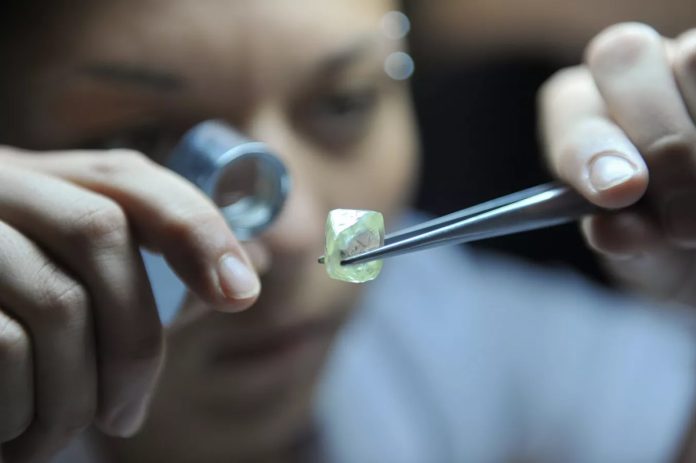The G7 countries have targeted Russia’s diamond exports since the first sanctions were imposed over the Ukraine conflict. Direct imports of Russian rough stones to the US and UK were banned soon after the conflict escalated. Last year, the G7 agreed to expand sanctions on Russia’s gems despite warnings of dire fallout for the industry.
Leading global diamond producers have sounded the alarm over expanded sanctions against Russian diamonds by the G7.
Gemstone cutters say the move is fraught with devastating consequences for the industry. There are concerns the restrictions will harm small and medium businesses in the US, trigger diamond shortages, and inflate prices for the gems.
Russia holds first place among the world’s rough diamond producers, accounting for roughly one third of the world’s supply and mining close to 42 million carats in 2022. Botswana in southern Africa is in second-place, with 75 percent of rough stones extracted going to the international diamond conglomerate De Beers.
In December, 2023, the Group of Seven (G7) major industrial countries announced a direct ban on Russian diamonds starting from January 1. This was to be followed by “phased restrictions on the import of Russian diamonds processed in third countries targeting March 1, 2024.” Countries importing rough diamonds within the G7 are to establish “a robust traceability-based verification and certification mechanism for rough diamonds” by September 1, 2024.
The European Union (EU) followed suit, declaring that “as of 1 September 2024, the ban will be expanded to include lab-grown diamonds, jewellery, and watches incorporating diamonds with a weight of 0.5 carat and above.”
Martin Rapaport, chairman of the Rapaport Group, founder of the Rapaport Diamond Report and the RapNet online diamond trading network, has emphatically warned that incoming new restrictions may “severely harm the US diamond and jewellery trade.” He urged others in the industry sharing his concerns to sign the Rapport US Diamond Protocol (USDP).
“We are deeply concerned that efforts by the G7 group and US regulations in support of President Biden’s executive order of December 22, 2023, will harm our trade,” Rapaport said. “If improperly implemented, compliance regulations will force small companies out of business, reduce fair market competition, restrict US access to non-sanctioned diamonds and restrain US trade.”
Diamond giant De Beers, now a subsidiary of Anglo American, and Botswana’s state-owned Okavango Diamond Company have also been unnerved by looming sanctions on Russia’s diamonds, urging the G7 to consider the “unintended consequences.”
“Effectively (African producers) would be forced to send all their diamonds in one direction rather than choosing… (and) ethical African diamonds would become much more expensive,” De Beers CEO Al Cook said on the sidelines of the African Mining Indaba in Cape Town earlier in February. He stressed that sanctions should be tailored so they do not create “terrible side effects.”
“Our position has always been very clear… Whatever measures are taken, they must just be aware that they don’t end up with unintended consequences and taking us backwards,” Okavango Diamond Company Managing Director Mmetla Masire told reporters.
Questions have been raised over where and how a diamond’s country of origin can be determined. Belgium has pitched its port of Antwerp as a site for checking imports. An estimated 84 percent of the world’s rough diamonds and 50 percent of cut diamonds pass through Antwerp, dubbed the diamond capital of the world.
Representatives of the Surat diamond industry in Gujarat, India, which heavily depends on imports of uncut gems from Russia, have also warned of dire fallout from the sanctions on Russia diamonds.
“This will give a major blow to the Surat diamond industry as nearly one third of the diamonds that are polished in Surat are from Russia,” said Dinesh Navadiya, regional chairman of Gems and Jewellery Export Promotion Council (GJEPC).
Overall, India is home to 90 percent of the world’s diamond cutting and polishing industry.
It is not yet clear what tracing systems the expanded sanctions against Russia’s diamonds will require, as its outlines remain vague. But industry experts agree it is likely to be very costly and fraught with logistical nightmares.
Western countries’ attempts to crack down on Russian diamond exports may lead to supply-chain disruption, harming the industry as a whole, Dmitry Birichevsky, the head of the Russian Foreign Ministry’s economic cooperation department, told Sputnik last year. He added that attempts to prevent Russian diamond exports are non-market oriented.
The Russian Finance Ministry said attempts by Western countries in recent years to label Russian diamonds as “bloody” were nothing but “political demagogy,” adding that diamond sales have financed the development of social infrastructure in the country.




